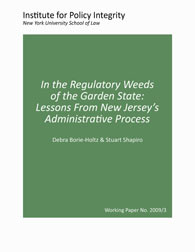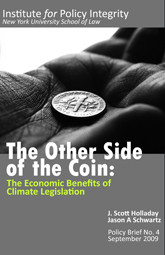-
Expanded comments on the New York State Energy Plan
Policy Integrity expanded on our initial comments on the New York State Energy Plan. In this version, more detail is offered on how the state could build efficiency incentives into its economic development programs.
-
Comments in support of changes to the Renewable Fuel Standard program
Changes to the Renewable Fuel Standard program were proposed by EPA in response to directives from Congress—if adopted, the rules will require that a higher percentage of transportation fuel sold in the United States be derived from renewable sources, such as corn‐based ethanol or biomass‐based diesel.
-
Letter to the Administration re: monetary calculations for the social cost of carbon
In the summer of 2009, the Department of Energy released a regulation to update electricity efficiency standards for vending machines. Though the rule itself was somewhat routine, it contained information that could have major effects on environmental regulation in the future.
-
Amicus brief against hazardous trucking regulations
In November 2008, the Bush Administration finalized a regulation allowing truck drivers to spend more hours behind the wheel. To counter the deregulation, advocacy groups including Public Citizen filed suit against the Federal Motor Carrier and Safety Administration (part of the Department of Transportation) in March 2009.
-

In the Regulatory Weeds of the Garden State
Lessons From New Jersey’s Administrative Process
There is a dearth of studies about the effects of the proceduralization of the rulemaking process on state regulations. In the Regulatory Weeds of the Garden State focuses on regulations promulgated in New Jersey, both prior to and following major procedural changes enacted in the state in 2001.
-

The Other Side of the Coin
The Economic Benefits of Climate Legislation
This brief compiles estimates from several different federal agencies, and calculates that the economic benefits of the emissions cap in the Waxman-Markey bill likely dwarf the costs by as much as 9-to-1 or more. The benefit to cost ratio was determined using the EPA’s previously released (and peer reviewed) cost estimates and a newly released “social cost of carbon” estimate from an interagency process which provides a conservative dollar figure for the benefits of greenhouse gas reductions.
-
Changes to EPA’s Cost-Benefit Guidelines
EPA has been quietly working on some serious changes to the guidelines it uses to conduct cost-benefit analysis. Tweaks to the powerful but low-profile Guidelines for Preparing Economic Analyses could have major impacts on the environment. The Guidelines is little known outside of the agency, but is used in the design of every major environmental regulation.
-
Policy Integrity submits second round of offshore drilling comments
Before leaving office in early 2009, the Bush Administration released a draft offshore drilling plan that is being taken up by the Obama Administration.
-
Legal petition to EPA to adopt cap-and-trade for vehicle emissions
Policy Integrity filed a legal petition with the EPA Administrator Lisa Jackson to propose and adopt regulations instituting a cap-and-trade system to control greenhouse gases emissions from fuels used in vehicles. This petition takes aim at emissions from all vehicles, which account for 36% of the total greenhouse gas emissions in the United States.
-
Comments to EPA in support of emissions findings
Policy Integrity submitted comments to EPA in support of the agency’s proposed findings that motor vehicle emissions of greenhouse gases contribute to dangerous air pollution. The comments also highlight some important issues for the agency to consider as it moves forward and call EPA’s attention to some legal obligations that will not be satisfied by the proposed endangerment findings alone.
